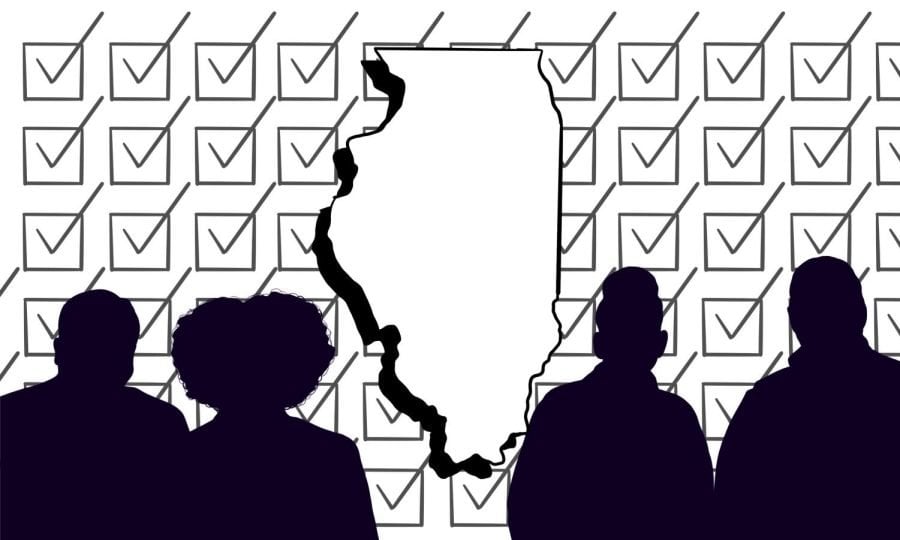The Daily Explains: How workers’ rights are on the ballot in November with Illinois’s Amendment 1
File Illustration by Olivia Abeyta
Many believe that Republican Darren Bailey’s nomination for governor reflects a rightward shift in the Illinois Republican Party.
October 5, 2022
On Nov. 8, Illinois voters will head to the polls to vote on Amendment 1, also dubbed the Workers’ Rights Amendment. The ballot measure could cement unprecedented collective bargaining rights for workers into Illinois’s constitution.
Amendment 1 would establish the state constitutional right for employees to organize and bargain collectively through chosen representatives, according to the office of the Illinois’ Secretary of State.
If ratified, the amendment would allow Illinois employees to negotiate wages, hours and working conditions, as well as advocate for their “economic welfare” and workplace safety. The proposed amendment also blocks laws that prevent workers from engaging in collective bargaining for these issues.
Currently, right-to-work laws in many states allow workers to decide whether to join their workplace’s union and pay dues. While current Illinois law prohibits local governments from creating right-to-work zones, Amendment 1 would codify a right-to-work ban into the state constitution.
If the amendment is ratified, Illinois law would allow workplaces to require workers to pay dues to the labor union as a condition of employment.
Right-to-work laws can make it difficult for unions to collect dues from workers who enjoy union protection, potentially restricting union resources and bargaining power. A report by a 2011 Economic Policy Institute estimates that on average, wages in states with right-to-work laws are 3.2% lower than other states.
Currently, 23 states don’t have right-to-work laws, while 27 states do.
Amendment 1 would take Illinois workers’ rights a step further than any other state in the nation. New York, Hawaii and Missouri have established the right to collective bargaining in their constitutions, but none have banned right-to-work laws.
Several Illinois unions, including the Associated Fire Fighters of Illinois and Chicago Teachers Union, have stated support for Amendment 1.
Federal law already governs organizing and collecting bargaining for private-sector workers, which prevents states from directly regulating these rights for these workers. The National Labor Relations Act, passed by Congress in 1935, allows private-sector workers to organize in unions and engage in collective bargaining. The legislation also prohibits employers from taking employment action against workers who participate in unions.
State Sen. Ram Villivalam (D – Chicago) told Vox Amendment 1 is notable because it applies to employer-employee relationships that are not covered by NLRA, including public-sector workers and agricultural workers.
On the other hand, the Illinois Republican Party opposes the amendment, along with organizations like the Illinois Association of School Boards and the National Federation of Independent Business. Opponents are against endowing more power to labor unions.
The Illinois Policy Institute, a libertarian think tank, also opposes the amendment, arguing it will increase property taxes. The amendment would likely lead to a tax hike estimated to be more than $2,100 for the typical Illinois homeowner if ratified, according to research conducted by the organization.
Illinois GOP Chairman Don Tracy has described Amendment 1 as a “disguised tax referendum, a Trojan horse.”
In April, attorneys from the Liberty Justice Center and the Illinois Policy Institute filed a petition to Seventh Judicial Circuit Court in Sangamon County to remove the amendment from November’s ballot. In the petition, the plaintiff argued NLRA supersedes Amendment 1’s attempt to provide a state-law right to collective bargaining, while violating the U.S. Constitution’s supremacy clause.
The petition was denied on May 26. The Fourth District Appellate Court of Illinois affirmed the decision on Aug. 26, allowing voting on amendment to move forward.
Illinois voters will now make the final call on Election Day. To ratify the amendment, three-fifths of those voting on the specific ballot measure, or a majority of those voting in the general election, must approve.
Email: [email protected]
Twitter: @JessicaMa2025
Related Stories:
— Union organizers debate ‘Workers Rights Amendment’ as November vote draws near
— Illinois workers no longer excluded from EIC tax relief due to age or immigration status












